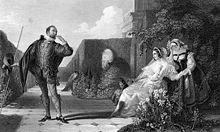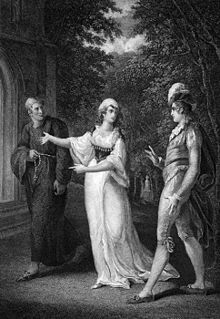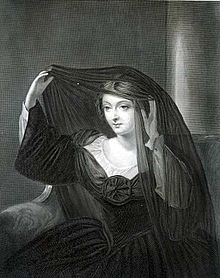- Olivia (Twelfth Night)
-
Olivia is a fictional character from William Shakespeare's play Twelfth Night, believed to have been written around 1600 or 1601. She is at the center of the various plots, both the comedic and the romantic. She has various suitors, but ends the play with Sebastian, the brother of the protagonist, Viola. Olivia is a character who allows her emotions to control her.
Contents
Role in the play
Olivia is a beautiful lady of noble birth who lives in Illyria. Before the play begins, she has recently lost her brother who was her guardian after her father died. This loss has made her grief stricken and she has refused to see anyone who does not reside in her household, and declared that she will be in mourning for the next seven years.
She is therefore surrounded by her young serving lady Maria, her uncle Sir Toby Belch, her steward Malvolio, the jester Feste, and Sir Toby's friend Sir Andrew Aguecheek.
 Malvolio and Olivia
Malvolio and Olivia
 A Priest, Olivia, and Sebastian
A Priest, Olivia, and Sebastian
Because of her wealth and beauty Olivia attracts various men who wish to marry her. The play begins with the Duke of Illyria, Orsino, pining away over his love for Olivia while she refuses to accept him as a suitor. Sir Andrew has been invited to her household by Sir Toby, and Andrew hopes to use his stay to make Olivia his bride. Malvolio uses his position as steward to gain her affections.
Despite all of the rumpus going on at her home, Olivia refuses all visitors until Orsino sends his new page, the protagonist of the play, Viola, to call on her.
Viola has been recently shipwrecked and she has taken on the disguise of a boy so that she may work for Orsino with no one knowing her true identity. During the shipwreck, Viola lost her brother, Sebastian, and she believes that he has died.
Olivia quickly falls in love with the witty Cesario (Viola's name when she is in disguise) because Cesario is unafraid of saying what he/she is thinking. Cesario also compliments Olivia on her beauty, something that helps heal Olivia's heart from the losses she has recently incurred.
Olivia attempts to woo the young Cesario/Viola and repeatedly asks/lures him to come back to her estate by using various tricks and problems. Olivia eventually comes to the conclusion that she must marry him. However, in a case of mistaken identity, she marries Viola's twin brother, Sebastian. All ends well however, because Sebastian and his sister are extremely similar.
The climax of the play takes place at Olivia's estate. It is here that Olivia and Sebastian are hastily married, Viola and Sebastian rediscover each other, Malvolio is rescued, and Orsino proposes to Viola.[1]
Character interpretation
Olivia is involved in all three of the main plots of the play: Orsino's love for her brings Cesario to her estate, Olivia's love for Cesario pleads her into marriage with Sebastian, and the entire plot with Sir Toby, Sir Andrew, and Malvolio revolves around Andrew and Malvolio's supposed love for her.
Olivia falls in love with Cesario very quickly and decides that, despite her previous declaration of mourning, she will marry him.
Depictions in film and on stage
One of Shakespeare's most popular plays, Twelfth Night has been produced for both the stage and film multiple times.
Stage
In 2009, Shakespeare in the Park put on a production starring Anne Hathaway as Viola and Audra McDonald as Olivia.
Film
In the first film version of the play, made in 1910, Julia Swayne Gordon depicted Lady Olivia.
Helena Bonham Carter played Olivia in Trevor Nunn's film, Twelfth Night.
In 2006 the play was adapted into a modern retelling titled She's the Man, starring Amanda Bynes as Viola and Laura Ramsey as Olivia.[2]
References
- ^ "Shakespeare Reference Center
- ^ She's the Man, DreamWorks, 17 March 2006.
Sources
- Guide to Twelfth Night
- Shakespeare's Twelfth Night, or What You Will
- Analysis of Major Characters in Twelfth Night
- Synopsis of Twelfth Night
- Summary of Twelfth Night and Characters
Characters in Twelfth Night Viola · Orsino · Olivia · Sebastian · Maria · Toby Belch · Andrew Aguecheek · Malvolio · Feste · Fabian · AntonioCategories:- Fictional characters introduced in 1602
- Female Shakespearean characters
- Characters in Twelfth Night
Wikimedia Foundation. 2010.

